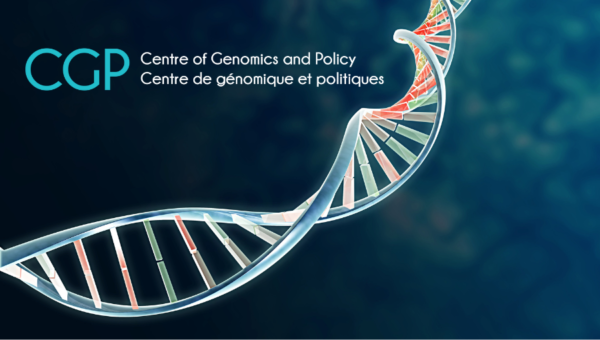
MRM Insights: The Centre of Genomics and Policy and Regenerative Medicine

Ma’n Zawati
Every month, in the MRM Insights, a member of the MRM Network writes about stem cells and regenerative medicine from a different perspective. This month, Dr. Ma’n Zawati, Assistant Professor at McGill University’s Faculty of Medicine and the Executive Director of the Centre of Genomics and Policy in the Department of Human Genetics, talks about McGill’s Centre of Genomics and Policy and the new Charter for Regenerative Medicine.
The Centre of Genomics and Policy and Regenerative Medicine
The Centre of Genomics and Policy (CGP) of McGill University is an interdisciplinary and international research Centre with a special focus on how universal human rights can both frame -omics and other health innovations while also supporting the promotion and protection of human health. With precision medicine increasingly relying on data-intensive novel technologies, there is a significant risk that actual and future benefits – if not complemented by ethico-legal and policy research – will be sub-optimally utilized or unevenly distributed. This could replicate pre-existing patterns of discrimination, leading to the erosion of public trust as well as undermining the ethical and legal duties of researchers and healthcare professionals. To address these important questions, the CGP pursues a unique, integrated and innovative research program founded on three universal human rights: 1) right to science; 2) right to non-discrimination and 3) right to health. These rights span numerous population and research contexts, including pediatrics, regenerative medicine, RNA-based precision medicine, rare diseases, cancer, clinical/research, -omics generally, and artificial intelligence.
For more than a decade, the CGP has provided support to researchers, health care professionals, patients, and policymakers around the world to help them navigate complex legal and policy issues. One example of such work is the development of a Charter for Regenerative Medicine, led by Prof. Bartha Maria Knoppers (available here). Following a decade of exponential increase in developments in regenerative medicine, the CGP has spearheaded the development of this Charter in order to meet a need for consolidated and most importantly, prospective ethical guidance. The Charter’s purpose is to bridge gaps regarding international human rights and ethical and professional norms for regenerative medicine. Its principled and yet actionable nature allows for countries, organizations, institutions, and individuals to adapt the best practices translating human rights to local needs.
The Charter is significant and of broad interest given the current progress in the regenerative medicine field. With patchworks of legislation and policy guidance across multiple jurisdictions, it also takes into account a decade of scientific and normative efforts of the WHO1 and of the international scientific and medical academies2 to begin to address actual issues while anticipating future directions. While the Charter encourages scientists and researchers to discuss and adopt its overarching principles, the public is a necessary and important part of this conversation. Publishing the Charter will begin the journey to reach and engage with a broad audience in order to elucidate and promote its principles as they affect the basic human rights to science, to health and to non-discrimination.
The methodology for the development of the Charter of Regenerative Medicine was extensive. It included reviewing international and national legal, ethical and scientific norms against a background of an ongoing literature review. Relevant case law was searched on WestLaw and CanLii from April-June 2022. The drafting process consisted of analysing these documents, noting relevant trends and gaps and integrating the critiques of our national and international collaborators (see list below).
The initial draft of the Charter was presented at the 2021 Till & McCulloch Meeting (TMM) of the Stem Cell Network of Canada and the final version was presented at its 2022 meeting. Additional ideas and needs were raised including tracking public concerns and adding a whistleblowing mechanism. Themes related to social justice, inclusion and international perspectives were also a large part of the TMM2022 session “Towards an International Charter for Regenerative Medicine.” To that end, the Charter should be viewed as an evolving and open document.
The Charter is the result of international collaboration. Hopefully, it will be an important tool in both anticipating and setting a direction for “ethics in practice” norms for regenerative medicine in research and in the clinic. The creation of the Charter also speaks to the need to continuously evaluate the norms set by the scientific community. We hope that by updating the past Stem Cell Charter we have set a precedent to continue to re-evaluate international guidance, as well as what information the public needs to properly address and evaluate future technologies.
List of Collaborators
Michael Rudnicki (Stem Cell National) (Canada)
Julie Fradette (ThéCell) (Quebec)
Michel L. Tremblay (McGill Regenerative Medicine Network)
Sowmya Viswanathan (University Health Network & CellCAN) (Toronto)
Tania Bubela (Simon Fraser University) (Canada)
William Brock (Canada) (Patient Advocate)
Annelien Bredenoord (Netherlands)
Sarah Chan (University of Edinburgh) (Scotland)
Zubin Master (Mayo Clinic) (USA)
Rosario Isasi (University of Miami) (USA)
Dianne Nicol (University of Tasmania) (Australia)
References
1. World Health Organization. WHO issues new recommendations on human genome editing for the advancement of public health. 12 Jul 2021 https://www.who.int/news/item/12-07-2021-who-issues-new-recommendations-on-human-genome-editing-for-the-advancement-of-public-health
2. National Academy of Medicine, National Academy of Sciences and the Royal Society, Heritable Human Genome Editing (2020), https://doi.org/10.17226/25665
